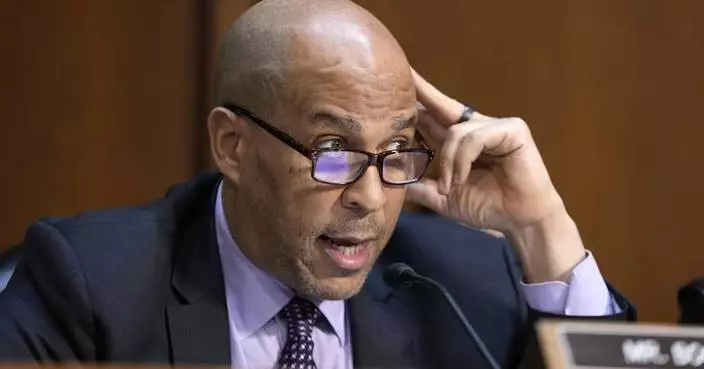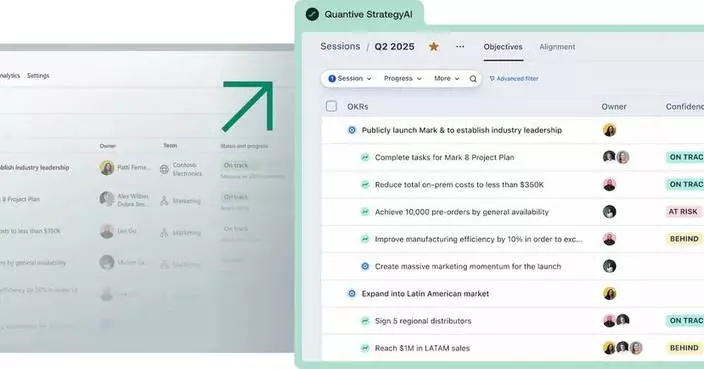PARIS (AP) — Her “political death.” That's how French far-right leader Marine Le Pen described what's at stake in a verdict expected Monday that could derail her plans to run in the next presidential election scheduled for 2027.
A judge is set to rule on whether Le Pen and her National Rally party embezzled European Parliament funds. She and 24 other party officials are accused of having used money intended for European Union parliamentary aides to instead pay staff who worked for the party between 2004 and 2016, violating the 27-nation bloc’s regulations.
Click to Gallery
FILE - Jordan Bardella, member of the European Parliament for the French Rassemblement National, attends a debate about Ukraine in the European parliament in Strasbourg, France, July 17, 2024. (AP Photo/Jean-Francois Badias, File)
FILE - French far-right leader Marine Le Pen arrives at the courtroom for the trial over the suspected embezzlement of European Parliament funds, Wednesday, Nov. 6, 2024 in Paris. (AP Photo/Aurelien Morissard, File)
FILE - French far-right leader Marine Le Pen arrives with her legal team at the court house in Paris, Sept. 30, 2024. (AP Photo/Thibault Camus, File)
FILE - French far-right leader Marine Le Pen reacts at the National Assembly before French Prime Minister Francois Bayrou delivers his general policy speech meant to outline his top priorities, Tuesday, Jan. 14, 2025 in Paris. (AP Photo/Thibault Camus, File)
FILE - French far-right leader Marine Le Pen answers to the media during a gathering in support of detained Franco-Algerian writer Boualem Sansal, in Paris, Tuesday, March 25, 2025. (AP Photo/Thibault Camus, File)
Le Pen, 56, and other co-defendants denied wrongdoing during the nine-week trial that took place in late 2024.
Le Pen’s greatest concern is that she could be declared ineligible to seek public office, if found guilty.
In case of conviction, the court could impose a period where she is ineligible to run for office “with immediate effect” — even if she files an appeal.
The court would also decide whether to give Le Pen a prison sentence — which would be suspended during any appeal.
That could prompt another possible headache for the far-right leader. If she appeals, she will automatically be granted a new trial, but it will likely take place in 2026, just months before the presidential election.
Le Pen appears to be anticipating a guilty verdict, telling the panel of three judges: “I feel we didn’t succeed in convincing you.”
During the trial, prosecutors requested a two-year prison sentence for Le Pen and a five-year period of ineligibility. They “want my political death,” Le Pen then said.
In a key decision on Friday, the Constitutional Council ruled that a period of ineligibility with immediate effect is in line with the French Constitution.
But it also stressed that it’s up to the judges to assess the consequences of imposing such a ban right away and make sure the ruling is “proportionate” and takes into consideration “the preservation of voters’ freedom.”
The Constitutional Council rendered its ruling in a separate case that has no direct link with Le Pen's.
Yet its conclusions have been scrutinized as they provide legal guidance that judges are likely to take into consideration.
The Constitutional Council also underlined that the court can decide to not impose any period of ineligibility immediately. In that case, the ban would be suspended pending appeal.
For over a decade, Le Pen has worked at making her party more mainstream, dulling its extremist edge to broaden its appeal to voters.
She led the National Rally from 2011 to 2021. She changed its name from the National Front, as part of her efforts to distance it from the period when her father ran it and it carried a heavy stigma of racism and antisemitism.
Now a lawmaker in the National Assembly, the French parliament's powerful lower house, she has already positioned herself as a candidate to succeed President Emmanuel Macron, having twice finished runner-up to him.
In 2022, Macron won with 58.5% of the vote to Le Pen’s 41.5% — significantly closer than when they first faced off in 2017 and the best score ever of the French far right in a presidential bid.
Ineligibility “would have the effect of depriving me of being a presidential candidate," she pleaded during the trial. "Behind that, there are 11 million people who voted for the movement I represent. So tomorrow, potentially, millions and millions of French people would see themselves deprived of their candidate in the election.”
Jordan Bardella, 29, succeeded Le Pen in 2021 at the helm of the party. He would likely be her prime minister if she were to become president.
That makes him widely perceived as her natural successor if she were barred from running.
Yet observers say there's no guarantee he would be able to convince as many voters as she does. In recent months, some inside the party have criticized his management as too focused on his personal career.
Since joining the party at age 17, Bardella has risen quickly through the ranks, serving as spokesperson and president of its youth wing, before being appointed vice president and becoming the second-youngest member of the European Parliament in history, in 2019.

FILE - Jordan Bardella, member of the European Parliament for the French Rassemblement National, attends a debate about Ukraine in the European parliament in Strasbourg, France, July 17, 2024. (AP Photo/Jean-Francois Badias, File)

FILE - French far-right leader Marine Le Pen arrives at the courtroom for the trial over the suspected embezzlement of European Parliament funds, Wednesday, Nov. 6, 2024 in Paris. (AP Photo/Aurelien Morissard, File)

FILE - French far-right leader Marine Le Pen arrives with her legal team at the court house in Paris, Sept. 30, 2024. (AP Photo/Thibault Camus, File)

FILE - French far-right leader Marine Le Pen reacts at the National Assembly before French Prime Minister Francois Bayrou delivers his general policy speech meant to outline his top priorities, Tuesday, Jan. 14, 2025 in Paris. (AP Photo/Thibault Camus, File)

FILE - French far-right leader Marine Le Pen answers to the media during a gathering in support of detained Franco-Algerian writer Boualem Sansal, in Paris, Tuesday, March 25, 2025. (AP Photo/Thibault Camus, File)
OCALA, Fla. (AP) — Tuesday's special elections for two Florida congressional seats in heavily pro-Trump districts have become an unexpected source of concern for national Republicans as Democrats have poured millions in fundraising into the races.
Both seats opened when President Donald Trump chose their representatives for jobs in his second administration. Matt Gaetz was briefly nominated to be Trump's attorney general before withdrawing, while Mike Waltz became national security adviser.
Florida state Sen. Randy Fine, running for Waltz's seat, and state Chief Financial Officer Jimmy Patronis, running to replace Gaetz, are widely expected to hold the seats in their reliably conservative districts, which would give Republicans a 220 to 213 advantage over Democrats in the U.S. House. But both have been outraised by their Democratic counterparts, and Republicans in Florida and Washington have begun trying to distance themselves from any potential underperformance.
Fine has attached himself closely to Trump. He texted The Associated Press on Monday a post on the social platform X from Trump, who encouraged voters to turn out for Fine on Election Day and said Fine was an “incredible fighter.”
The president amplified his message in a Tuesday post on his Truth Social platform.
“Randy Fine has my Complete and Total Endorsement! Election Day is TODAY. GET OUT AND VOTE FOR RANDY — HE WILL NOT LET YOU DOWN!,” the post said.
Special elections are often low-turnout events that can lead to surprising results. But anything other than blowout victories in either district would be noteworthy.
In the November election, Gaetz won the 1st Congressional District in Florida’s heavily conservative Panhandle by 32 percentage points. Waltz won the 6th Congressional District — which includes deeply red regions in northeastern Florida — by about 33 percentage points.
Both Patronis and Fine have been outspent and outraised by their Democratic opponents, Gay Valimont in District 1 and Josh Weil in District 6.
Valimont has raised about $6.5 million according to fundraising reports, versus Patronis’ $2.1 million. Weil has raised $9 million for his race, compared to about $1 million raised by Fine, according to his campaign contributions report.
Democrats credit the money raised in these races to grassroots support fueled by anger at the first two months of the second Trump administration.
This momentum is placing unexpected pressure on Fine, a self-described conservative firebrand who lives outside of the district. Fine said last week that he put $600,000 of his own money into the race.
Fine is known for his support of Israel and his efforts to restrict LGBTQ+ rights. Over the past few years, he has sparred with Gov. Ron DeSantis, recently during the Legislature's special session on immigration, and again in August when he criticized the governor's trip to Ireland, calling it an “antisemitic country" after the island nation recognized a Palestinian state.
DeSantis, who formerly represented the 6th Congressional District before becoming governor, said last week that he expects Fine to deliver an “underperformance" compared to the votes he and Trump got in that district. He called it a “reflection of the specific candidate running in that race” rather than a reflection on Trump.
“I think the district is so overwhelmingly Republican that it’s almost impossible for someone with an R by their name to lose that district, so I would anticipate (a) Republican candidate is still going to be successful,” DeSantis said.
Weil is an educator and single father with two boys who describes himself as a “proud progressive.” He unsuccessfully sought the Democratic nomination for the U.S. Senate seat that was occupied by Republican Marco Rubio. Weil withdrew his candidacy before the primary in a crowded field that ended up nominating former Rep. Val Demings, who lost to Rubio.
He appeared at a Monday rally of about 100 volunteers, veterans, retired residents and even Republicans who decided to work in his campaign. He thanked the group for their support.
“Your voices are essential for me being able to serve you in Congress,” Weil said.
The crowd cheered and waved signs reading “A Teacher Representing You.”
Peter Schaper, a 34-year-old resident who lives with his parents in the Villages, said he voted for Weil because he is concerned about his parents being affected by any threats to Medicare and Social Security.
He said his dad has been on lots of medication since liver transplant surgery in 2017, and he is worried about the Trump administration potentially cutting parts of Medicare and Social Security.
“If God forbid something happened to Medicare or Social Security, as it looks like it might, I don’t know what’s going to happen to them,” Schaper said of his parents.
In Daytona Beach, 82-year-old Francis Allen said she has been voting for 30 years in every election, whether special or primary, and she believed it was important to turn out in this election because she heard it was going to be close.
Allen said she voted for Trump in November, because she believes he’s bringing this country in the right direction, and she voted for Fine because he’s “on the same wavelength” as Trump.
“I think it goes hand in hand. His (Trump) people are on the same wavelength he’s on. It’s like peanut butter and jelly,” Allen said.
North Carolina Rep. Richard Hudson, who heads the National Republican Congressional Committee, also acknowledged Fine should have stepped up his fundraising earlier but said he still expects him to win.
“I’m not concerned about margins,” Hudson said. “I mean, special elections are special.”
Associated Press writer Curt Anderson in St. Petersburg, Fla., contributed to this report.

Josh Weil talks to a group of supporters during a Get Out the Vote event in Ocala, Fla., Monday, March 31, 2025. (AP Photo/Stephany Matat)



























































